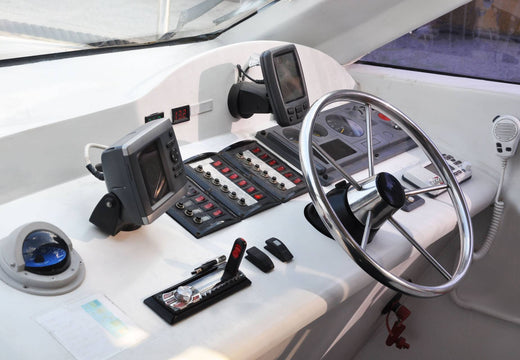
What Electronics Do You Need on a Boat?
Nicholas HeislerShare
Unless you are a purist with a passion for historical sailing methods and a deep knowledge of celestial navigation, you will need a bevy of electronic equipment on your boat that covers an array of essential purposes, such as:
- Communication
- Navigation
- Monitoring Boat Systems
Entertainment could be considered to be a final category, but devices such as televisions are generally not seen as “essentials.” In any case, some items’ functions may overlap between the above categories, but each piece of electronic equipment fulfills at least one necessary role.
Communication Equipment
Whether you want to call for help or chat with a fellow boater, you’ll need a way to reach them. With that said, your options include the following:
VHF Radio
Should you need to reach out to law enforcement or even the Coast Guard, you’ll need a very high frequency (VHF) radio. It’s more reliable than a cell phone, which can lose signal or drain the battery, leaving you unable to call anyone.
With a digital selective calling (DSC)-enabled radio, operators can send distress signals directly to emergency responders, and depending on the features built into the radio, it may automatically provide your GPS location with the distress call as well.
Automatic Identification System
While an Automatic Identification System (AIS) won’t send specific messages, it will constantly broadcast your boat’s name, position, course, and speed, giving boaters the ability to keep out of each others’ way and anticipate where other vessels are heading. Some AIS equipment includes two-way receivers that can display the position of your boat and other boats in the area at the same time.
Navigation
Even skilled sailors with a full-fledged knowledge of celestial navigation will need assistance from basic equipment, especially when there’s cloud cover. As such, these are your options:
Compass
At the bare minimum, you should have a compass on board, and electronic compasses are preferable because they tend to be more accurate.
GPS/Chartplotter
Even if you have GPS services on your phone, consider a dedicated chartplotter. These feature charts with waypoints and water routes not shown on standard smartphone maps, and they are designed with marine use in mind, providing waterproof enclosures and simple control layouts. Should power cut out for any reason, keep paper charts on your boat, too.
Fishfinder/Depthfinder/Sonar
These devices are useful for more than just fishing excursions, as they operate using sonar to measure water depth. Fishfinders, though, will generally display more information for anglers looking for their next catch, such as water temperature and the contours at the sea bottom.
Radar
While depthfinders and fishfinders are largely vertical in their operational range, radars extend horizontally, showing boaters other vessels and objects in low or zero-visibility situations.
Autopilot
Simple autopilot systems will maintain a set heading, while more advanced versions can use inputs from chartplotters to follow a plotted course.
Wi-Fi/Cell Range Booster
Should you want to continue using your cellphone, whether to communicate, help in navigation, or for entertainment purposes, a Wi-Fi or cell range booster can help you maintain a strong signal on the water.
Monitoring Boat Systems
Using monitoring systems to stay on top of your boat’s health will keep you from getting stranded, and they make operating your boat far more convenient. Your options for these devices include the following:
Multifunctional Displays (MFDs)
These devices funnel the various systems of the boat into a single display and interface, allowing the boater to control all of the vessel’s digital systems without having to access multiple pieces of equipment, such as the radar, chartplotter, lighting, cameras, and various entertainment systems, at once.
Engine Monitor
The functionality of an engine monitor may generally be integrated into the MFD, but even if your engine has separate monitoring functions, you need a way to view the engine’s temperature, RPM, fuel level, and any warnings indicating low oil or other such issues.
Battery Monitor
Without your battery, you’re dead in the water. Keeping tabs on its state of charge and overall health will inform you as to whether it’s good for a day on the water or in need of replacement.
Do Boats Come With Electronics?
Included electronics will depend on the boat. Just as cars may be feature-rich or relatively barebones, so are boats. If you’re buying a new boat, you may be able to select which electronics are included, and you may even be able to choose specific brands or models of devices, whereas if you’re purchasing a used boat, you’ll need to investigate which items come with it.
In either case, you will need to inspect the electronics carefully before making a purchase. If they seem damaged due to neglect or misuse, you’ll need to take that into account and either negotiate a lower purchase price or walk away entirely. Never settle for lessened safety.
When it comes to keeping your boat clean, look to Captains Preferred Products boat cleaning supplies. Find everything you need to keep your vessel squeaky clean all season — always at the best prices.




